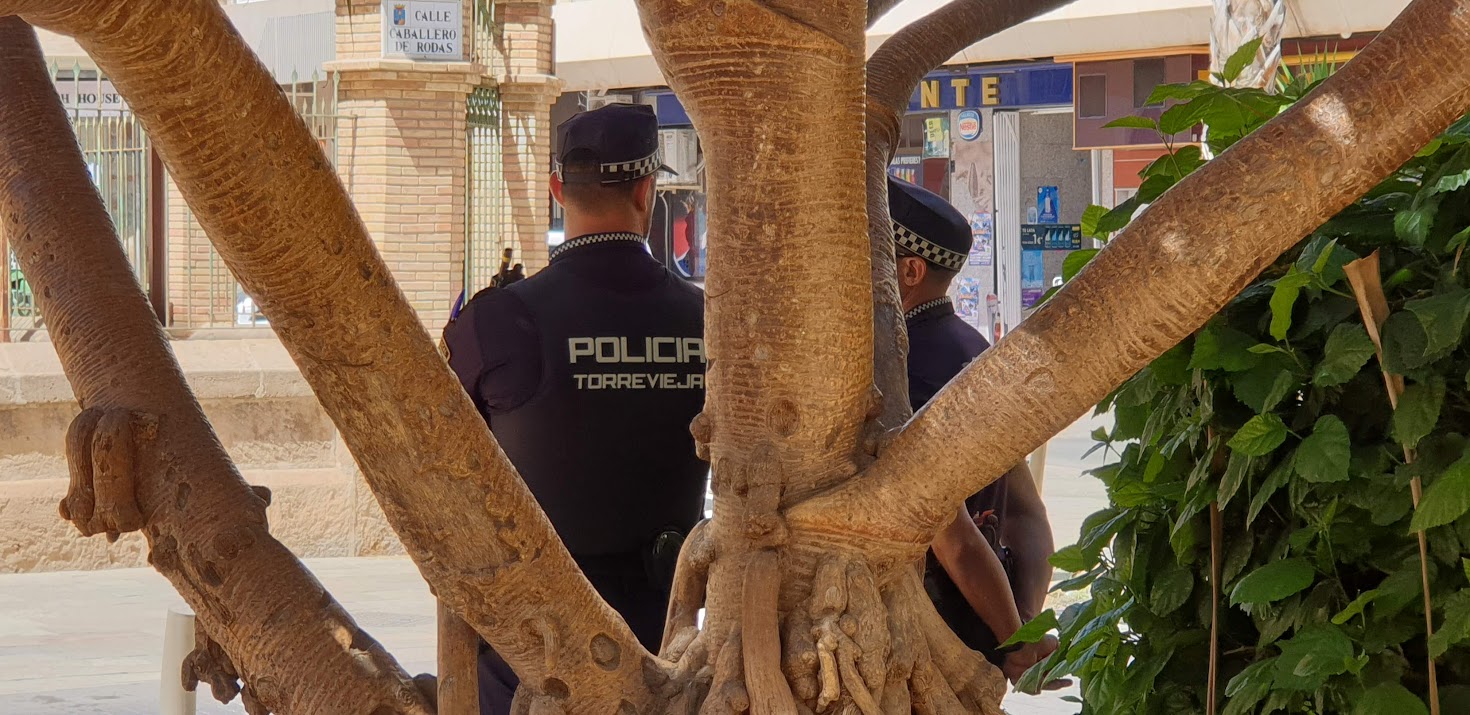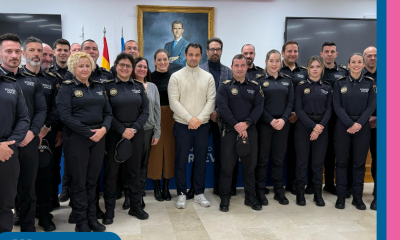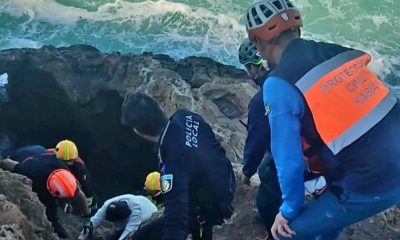Costa Blanca
Constitutional Court condemns Torrevieja Council for harassing a police officer

After reporting irregularities that had occurred “systematically” within the force, a former Torrevieja Local Police officer was subjected to “constant harassment” from his superiors. The First Chamber of the Constitutional Court has upheld the award of nearly €100,000. The ruling, which was published in the Boletín Oficial del Estado (Official State Gazette)BOE)) on Friday, deems the “harassing conduct” experienced by officer Antonio RB, a career civil servant who held the status of protected victim of the Valencian Anti-Fraud Agency, to be “judicially proven.” It also emphasises that the Torrevieja City Council “actively participated, institutionally and within its scope of powers, in some of the harassment acts that have been judicially proven.”
The police officer’s claim for financial liability for workplace harassment was upheld by the Elche Administrative Litigation Court No. 1 in 2018. The initial judgement was overturned by the Second Section of the High Court of Justice of the Valencian Community (TSJ-CV) after an appeal, which ruled out the existence of workplace harassment. The officer’s appeal against the TSJ-CV ruling was subsequently dismissed by the Administrative Litigation Division of the Supreme Court. The Constitutional Court ultimately upheld the initial judgement, declaring it final, after the officer filed an appeal for constitutional protection.
The officer’s ordeal commenced in 2010, when the Torrevieja Local Police, which had been recently appointed under the Popular Party mayor Pedro Hernández Mateo, issued a warning regarding the lack of control over the cash collected in fines and the “systematic” inspections of specific entertainment venues. This was in contrast to the inaction in other establishments, despite unfavourable reports.
The incident was reported by him and two other police officers three years later, and an inspector and two officers were subsequently investigated. The complaint resulted in harassment, including the following: the removal of his weapon and documents from his gun rack and locker, the alteration of his schedules without prior notification and the assignment of new ones without the required rest period, and the denial of vacation time.
Manuel Antonio LV, one of the police commanders who co-defended the city council, published a “pamphlet” in which he referred to the officer as a “cephalopod” and a “slimy, disgusting animal” and disclosed private information on a notice board that was “visible to all personnel.” In the interim, the Alicante Traffic Department received a letter from the co-defendant Torrevieja Local Police Chief, Vicente GS, in which he suggested that the officer may have misplaced his driving licence.
He encountered a “rare atmosphere towards him” at his new post, the Alguazas Town Hall in the Region of Murcia, in 2016. He discovered that his medical records had been sent from Torrevieja and “reported as problematic” after consulting with a colleague. ” Subsequently, he was relocated to Lorca, “where he is at ease.”
Vicente GS and Manuel Antonio LV, the latter has now retired, were previously deemed to be “instigators of workplace harassment” in two “very similar” proceedings. As a result, the Vega Baja council was required to provide compensation to two other officers in the amount of 71,950 euros.
The Torrevieja City Council was aware of, permitted, and condoned the “true and certain” workplace and psychological harassment that the inspector and the superintendent of the Local Police endured for several years. The ruling asserts that both officers were “instigators of other harassment” of Local Police officers on multiple occasions.
The trial judge underscored that the officer’s account was not refuted by any witnesses or expert reports provided by Torrevieja City Council. Conversely, the victim’s testimony concerning the infringement of her moral integrity, personal dignity, and fundamental rights was “conclusive.”
The “hostile environment” and “psychological violence”
The Constitutional Court maintains the initial ruling and emphasises that “the concept of workplace harassment can encompass situations or behaviours of various kinds, whether specific or repeated over time, but they all have in common (…) the degrading nature of working conditions or the hostility they entail, and which have the purpose or result of attacking or endangering the employee’s personal integrity.”
The court determines that the alleged constitutional violation is “clearly indicative,” indicating a “reasonable suspicion” that the police officer’s treatment was workplace harassment that “significantly harmed his physical and moral integrity.”
“He was deliberately and repeatedly humiliated with the intention of violating his dignity, resulting in a hostile and psychologically violent environment that not only prompted him to demand a change of workplace but was also exacerbated by the city council’s repeated refusal to grant him this, ultimately having a significant impact on his physical and mental health,” the ruling states.
The Constitutional Court also gives “special emphasis” to the fact that the Torrevieja City Council “not only consciously remained indifferent to the hostile conduct” towards the police officer, in a “repeatedly passive position” maintained “for years,” but also “actively participated, institutionally and within its scope of powers, in some of the acts of harassment that appear to have been judicially proven.”
Discover more from Costa Blanca Daily
Subscribe to get the latest posts sent to your email.
Costa Blanca
In Alicante, three arrested for stealing a gold chain from a man who was working out

Three men have been taken into custody by National Police officers in Alicante on suspicion of violent robbery and resisting an officer. A gold chain was brutally torn from around the neck of a man who was exercising in public after the suspects asked him to take a picture of them. A foot chase and prompt police action led to the recovery of the jewellery and the arrest of the offenders.
The incident started when someone called CIMACC Room 091 to report that he had been robbed. The victim was seen pursuing three males by the patrol sent to the location, but they ran away when they saw the police.
Officers started a foot pursuit right away, and the three males were finally apprehended and stopped. They were charged with violent robbery and resisting arrest. Officers recovered the stolen gold chain, and it was given back to its rightful owner.
The victim informed police that two people approached him while he was playing sports in a public area and requested him to take their picture. While he went to retrieve his mobile phone, one of the criminals violently grabbed him by the neck and pulled his chain. The three accused attempted to escape after physically assaulting him for resisting.
The inmates have been turned over to the Alicante investigating court after police investigations.
Discover more from Costa Blanca Daily
Subscribe to get the latest posts sent to your email.
Costa Blanca
Young man arrested in Alicante for murder in France

In a combined operation by the Spanish National Police and French authorities, S. AB, an 18-year-old Algerian immigrant, was found and taken into custody on Tuesday 25th March in Alicante, in the Valencian Country, about two months after he fled France, where he was wanted for murder. A 25-year-old security guard at a popular nightclub in the city of Saint-Étienne took in the youngster, who had entered the country illegally. The individual who was arrested is being held by the police while they wait for him to be extradited to France, which may take up to a month.
After failing to get in touch with the victim for days, a relative went in search of him and discovered him dead inside his flat on February 9th. There were no indications that a knife or gun had been used. The autopsy’s forensic specialists determined that strangulation-induced cardiac arrest was the cause of death. Although the motive for the crime is still being investigated, investigators discovered evidence of drugs next to the body, which could indicate retaliation for a drug debt or another disagreement involving drug trafficking.
Searching for a “very dangerous” fugitive for a month
SAB was always the main suspect in this case; the victim’s family knew he had provided him with shelter in the days before her death, and they didn’t hear from him again. Officers from the Specialised Organised Crime Division tracked the suspect’s potential exit from the country after learning that he had departed Saint-Étienne in the hours immediately after the murder. Hundreds of bus and train station cameras were examined, yet SAB used covert means to enter Spain and continued to travel till he arrived in Alicante.
Two weeks after the crime, on February 22th, Interpol released a Red Notice, which is an arrest and surrender warrant that permits worldwide cooperation in the apprehension of dangerous criminals, along with the suspect’s information and photo. This information, along with other details regarding his potential movements throughout Spain, was gathered by the Spanish National Police’s Fugitives Squad. A few weeks later, police were able to track him down, and they conducted close surveillance in the Alicante region until March 25th, the day he was arrested.
There were no problems during the arrest process. The police are currently working to determine the motive behind the murder while his extradition is pending. At this point, it’s unknown if it was a personal conflict or anything related to drugs.
Discover more from Costa Blanca Daily
Subscribe to get the latest posts sent to your email.
Costa Blanca
Alicante health centres are restricting phone appointments

Phone medical care was promoted during the pandemic to conduct pre-screenings for coronavirus cases and provide information about the disease. It subsequently became established as a useful tool to expedite consultations that did not require in-person visits and to relieve congestion in overcrowded health centres. However, in recent weeks, some patients have encountered difficulties requesting a telephone appointment through the Ministry of Health’s app, GVA SALUT+, as this option is not available in some health centres, leaving only an in-person choice.
The regional government explains that this is because telephone consultations may experience “long delays” due to congestion, but denies that this option has been eliminated in any health area. In cases where telephone appointments are not available on the app, patients who wish to be seen by their primary care physician by phone must request it directly from the admission staff at their reference health centre, according to healthcare professionals consulted by this newspaper.
Medical sources explain that in some health centres, telephone appointments have been restricted to certain professionals due to their widespread use and the “frequent” lack of response from some patients when the doctor called. This situation especially affects people who study or work outside their city of origin and cannot attend their health centre in person.
Affected People
“I always made a telephone appointment with my doctor. For example, the other day I had a urinary tract infection, and although I was treated at another emergency room, I usually followed up with my doctor so she could prescribe more medication if necessary,” explains O.P., a patient who has been unable to access this option for at least three weeks.
A similar case is that of V.F., who lives outside his city and needed to process a medical leave after suffering a severe blow that landed him in the emergency room. “I had to go to my health centre in person for the appointment with my doctor,” he notes. Despite these testimonies, the Regional Ministry of Health insists that telephone consultations are still available at all health centres and attributes the incidents to “specific technical adjustments to the schedules.” Furthermore, they emphasise that they consider this resource “very valuable” and that they do not intend to eliminate it.
Differences between in-person and telephone appointments
Regarding the time difference between in-person and telephone appointments, a notable difference can be observed at some health centres in the province. At the San Blas health centre in Alicante, in-person appointments are available same day with several times to choose from, while telephone appointments are delayed by two weeks.
At the Plaza América health centre, also in Alicante, the telephone option with some professionals does not offer appointments, and at the I de Villena health centre, it is not even available. In Elche, at the Doctor Alberto García auxiliary office, appointments by phone are delayed by almost two weeks.
In-Person
It’s worth remembering that the Ministry of Health has prioritised in-person care over telephone calls in the provinces of Alicante, Valencia, and Castellón in the last month, as part of the new scheduling model implemented by the Directorate General of Primary Care. According to doctors consulted, the new schedules limited telephone consultations to a maximum of six per day, which has significantly reduced their availability.
Discover more from Costa Blanca Daily
Subscribe to get the latest posts sent to your email.
-

 Costa Blanca2 weeks ago
Costa Blanca2 weeks agoElche is seeking tender for an additional 22,000 plants, shrubs, and flowers from 150 different species
-

 Costa Blanca2 weeks ago
Costa Blanca2 weeks ago€85,000 lottery winner in Torrevieja
-

 Costa Blanca2 weeks ago
Costa Blanca2 weeks agoMan sought for robbery and fraud in Amsterdam has been caught in Alicante
-

 News2 weeks ago
News2 weeks agoTwo arrested in Elda for stealing from restaurants and hostels
-

 Costa Blanca1 week ago
Costa Blanca1 week agoIn Alicante, a criminal group that specialised in robberies at pharmacies and banks has been dismantled
-

 Costa Blanca2 weeks ago
Costa Blanca2 weeks agoMan stole fire extinguishers to sell as scrap metal
-

 Costa Blanca2 weeks ago
Costa Blanca2 weeks agoAlicante’s new rent cap
-

 Costa Blanca2 weeks ago
Costa Blanca2 weeks agoIn Torrevieja, twenty new local police officers assume their duties


















